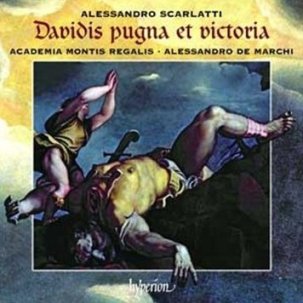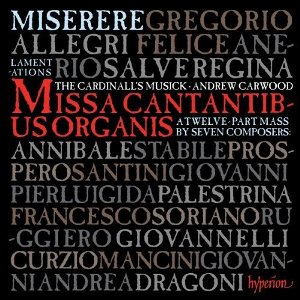Alessandro Scarlatti: Davidis pugna et Victoria
Originally written for musicalcriticism.com
14 October 2009
When opera was banned during the season of lent, such was the demand for oratorio that Alessandro Scarlatti wrote 38 in his lifetime, most of which were for performance in the Roman church or private palaces.
Davidis pugna et victoria was written for a company of Roman noblemen – Arciconfraternita del Santissimo Crocifisso – and first performed in Holy Week, 1700.
This setting of the story of David and Goliath is much expanded to allow a deeper exploration of the characters and, in particular, to explore Saul’s concerns about the forthcoming battle. Concentration on Saul's worries makes for quite a long first part which also dwells on a more general idea: the uncertainty of fortune, which, as Carrie Churnside explains in her notes, would have been a familiar poetic theme for seventeenth-century audiences. On this recording Saul is sung by the countertenor Martin Oro and he brings a particularly mournful hue to the opening concertino ‘Heu perii’ (Alas, I die). Oro has a very rich and dark sound that can occasionally become a little too covered for my tastes, but in this oratorio he is very well cast for so much introspective material.
Apart from the inevitable development of the biblical characters, one notable deviation to the story as related in the book of Samuel is the addition of Saul's own son, Jonathan – sung by soprano Robin Johannsen. Jonathan only features in the first half and then mostly as a sounding-board for Saul's reflective arias but the appearance of this character allows the libretto to explore Jonathan and David’s infamous closeness after the battle. Johanssen’s is a crystal-clear soprano with a beautiful tone and as such is well matched to David, sung by soprano Roberta Invernizzi. Invernizzi is probably my favourite singer on this recording; she has a real bloom to her voice, which allows her to negotiate fiendishly tricky passages with ease, and in several of her arias she executes a wonderful messa di voce.
The romantic undertones to the shared aria In flore labente are quite obvious where Jonathan and David speak of the dew on flowers and the sunset. Both sopranos enjoy the texts and the sounds of the language which lead them into the duet Sic et mortis and the inevitable chorus looking forward to victory. When Goliath does arrive it is in the form of the bass Antonio Abete. There are some wonderfully low arias with hints of buffoonery that are delightfully understated by Abete who, thankfully, resists the temptation to send his character up, resulting in a powerful performance.
The Academia Montis Regalis was born out of orchestral courses specializing in seventeenth and eighteenth century repertoire lead by leading international early music specialists. Now a busy professional ensemble under the direction of Alessandro De Marchi this is their third oratorio recording for Hyperion. The orchestra has a particularly energetic style that suits the many short sections of this work and De Marchi keeps tempi on the brisk side whilst coaxing some graceful gestures out of the instrumentalists – most notably the nimble concertino players.
This is a great oratorio and very well presented recording. However, it is difficult not to make comparisons with The King's Consort who used to occupy this niche in the Hyperion catalogue but there are a few moments where the solo singing from Academia Montis Regalis can be slightly too heavy compared with the lightness usually heard from an English group or from many of the other leading European ensembles.
Academia Montis Regalis/Alessandro De Marchi (Hyperion CDA67714)
14 October 2009
When opera was banned during the season of lent, such was the demand for oratorio that Alessandro Scarlatti wrote 38 in his lifetime, most of which were for performance in the Roman church or private palaces.
Davidis pugna et victoria was written for a company of Roman noblemen – Arciconfraternita del Santissimo Crocifisso – and first performed in Holy Week, 1700.
This setting of the story of David and Goliath is much expanded to allow a deeper exploration of the characters and, in particular, to explore Saul’s concerns about the forthcoming battle. Concentration on Saul's worries makes for quite a long first part which also dwells on a more general idea: the uncertainty of fortune, which, as Carrie Churnside explains in her notes, would have been a familiar poetic theme for seventeenth-century audiences. On this recording Saul is sung by the countertenor Martin Oro and he brings a particularly mournful hue to the opening concertino ‘Heu perii’ (Alas, I die). Oro has a very rich and dark sound that can occasionally become a little too covered for my tastes, but in this oratorio he is very well cast for so much introspective material.
Apart from the inevitable development of the biblical characters, one notable deviation to the story as related in the book of Samuel is the addition of Saul's own son, Jonathan – sung by soprano Robin Johannsen. Jonathan only features in the first half and then mostly as a sounding-board for Saul's reflective arias but the appearance of this character allows the libretto to explore Jonathan and David’s infamous closeness after the battle. Johanssen’s is a crystal-clear soprano with a beautiful tone and as such is well matched to David, sung by soprano Roberta Invernizzi. Invernizzi is probably my favourite singer on this recording; she has a real bloom to her voice, which allows her to negotiate fiendishly tricky passages with ease, and in several of her arias she executes a wonderful messa di voce.
The romantic undertones to the shared aria In flore labente are quite obvious where Jonathan and David speak of the dew on flowers and the sunset. Both sopranos enjoy the texts and the sounds of the language which lead them into the duet Sic et mortis and the inevitable chorus looking forward to victory. When Goliath does arrive it is in the form of the bass Antonio Abete. There are some wonderfully low arias with hints of buffoonery that are delightfully understated by Abete who, thankfully, resists the temptation to send his character up, resulting in a powerful performance.
The Academia Montis Regalis was born out of orchestral courses specializing in seventeenth and eighteenth century repertoire lead by leading international early music specialists. Now a busy professional ensemble under the direction of Alessandro De Marchi this is their third oratorio recording for Hyperion. The orchestra has a particularly energetic style that suits the many short sections of this work and De Marchi keeps tempi on the brisk side whilst coaxing some graceful gestures out of the instrumentalists – most notably the nimble concertino players.
This is a great oratorio and very well presented recording. However, it is difficult not to make comparisons with The King's Consort who used to occupy this niche in the Hyperion catalogue but there are a few moments where the solo singing from Academia Montis Regalis can be slightly too heavy compared with the lightness usually heard from an English group or from many of the other leading European ensembles.
Academia Montis Regalis/Alessandro De Marchi (Hyperion CDA67714)



Comments
Post a Comment